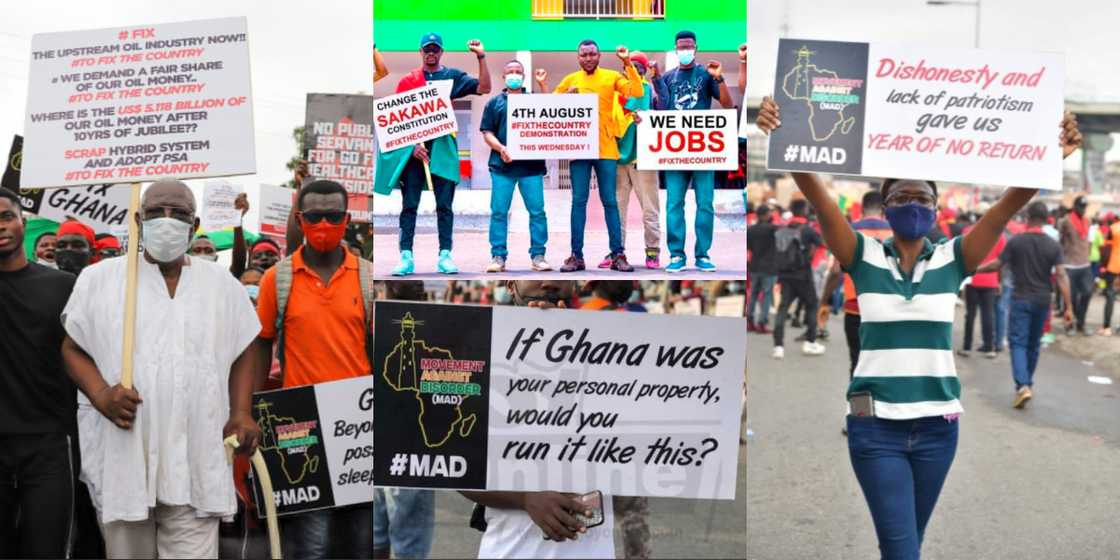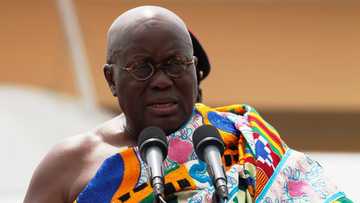FixTheCountry: How social media gave a voice to Ghanaian protesters before and during demonstration
Thousands of disgruntled Ghanaians joined the #FixTheCountry protest on Wednesday, August 4, 2021, marching through some principal streets in Accra to demand better living conditions.
Our manifesto: This is what YEN.com.gh believes in
Besides demanding improvements in social and economic situations, the protesters marched for a new constitution, accountability, and good governance from the Government of Ghana.
The protesters wielded placards with varying inscriptions such as #FixOurEducation system now, a new constitution now, Justice for Kaaka, and several others.
The #FixTheCountry protest was hugely successful as thousands of Ghanaians, including the youth and senior citizens, joined the march to pile up pressure on the government to address the nation's numerous challenges such as youth unemployment, poor infrastructure, and high cost of living.

Source: Twitter
Early days of #FixTheCountry on social media
Long before the #FixTheCountry campaign, young people in Ghana had discovered social media to vent over the ''poor'' state of affairs in the nation.
The #FixTheCountry advocacy, like many agitations, began as a social media campaign and emerged into a full-fledged movement propelled by Ghanaian youth.
Government supporters in Ghana, in the early stages of the advocacy on social media, sought to start a countertrend under the hashtag #FixYourSelf but the intensity of the backlash from a cross-section of Ghanaians and the backing of social media influencers pushing the campaign in the early stages drowned the opposing voices of powerful political figures.
Hundreds of social media users, particularly the youth, adhered to the hashtag #FixTheCountry to mount pressure on the Nana Akufo-Addo-led government to improve its citizens' lives as they demanded more jobs, no corruption, fewer taxes, and better education. The masses won!
Ernesto Yeboah, of the activist group Economic Fighters League, told DW that the movement came about out of a feeling among the youth of not being heard by those in charge of the country. "We are hungry. Things are bad. Things are difficult. Life is tough. And it doesn't make the headlines,'' said www.dw.com, quoting Ernesto Yeboah.
With only about 10% of university students or graduates finding jobs one year after completing school, in a country that churns out more than 270,000 graduates every year from public and private universities, according to www.dw.com, many young people could relate to the call for more jobs and improvements in their lives, joining the protest to vent their frustration.
The power of social media during protest
Armed with smartphones, digital cameras, and social media apps, the conveners of #FixTheCountry galvanised the masses and on Wednesday, August 4, hit the streets to protest.
Senior Ghanaian citizens, including a 72-year-old woman, joined the protesters, who first gathered at Obra Spot at the Kwame Nkrumah Circle in Accra at 7 am and marched towards the Black Star Square.
The scenes were captured and uploaded on social media as early as 7 am when the protest began.
Hundreds of the demonstrators wore red and black t-shirts featuring the hashtag and carried placards to convey their messages and demands.
Celebrities at #FixTheCountry protest
Unlike #DumsorMustStop in 2015, #FixTheCountry had fewer celebrities leading the march to vent their frustration against the ruling government.
In 2015, movie stars in Ghana, such as Yvonne Nelson who spearheaded #DumsorMustStop, actor Van Vicker, singer Efya, took on the Government of Ghana over the issue.

Read also
FixTheCountry: 10 powerful photos showing how protesters boldly told Akufo-Addo to level up
During the #FixTheCountry protest on August 4, one of the few distinct and popular faces among the demonstrators was Blakk Rasta. The popular radio personality expressed his intent for joining the protest, saying: ''We are here to demonstrate, to show that we are not happy with the system. We are here to let the whole world know that we have a leadership that is not representing us ...,'' said Blakk Rasta to citinewsroom.com.
Impact of #FixTheCountry protest
The #FixTheCountry protest was hugely successful, but that would not be the last one, according to one of the conveners, Ernesto Yeboah. He disclosed that similar protests like the one held on Wednesday, August 4, 2021, will take place in other parts of the country, citinewsroom.com reported.
However, some popular voices in Ghana, including the political activist Kwame Asare Obeng, famed as A Plus, have said the organisers of #FixTheCountry lacked direction and failed to produce a plan and road map for the march on August 4.

Read also
COVID-19 active cases rise from 1,600 to 6,766 as Volta, Bono emerge as Delta variant hotspots
A Plus went as far as reducing the #FixTheCountry demonstration to a keep fit exercise and not a protest. But other dissenting voices strongly think otherwise.
With the ruling government being in power for only eight months in its second term, it's still too early to measure the impact of the #FixTheCountry demonstration, especially when the general elections are more than three years away, albeit, the organisers have said that the protest was apolitical, and not an agenda to change the government.
Though general elections are not won on social media, any ruling government worth being reelected or resolved to retain power, would not dismiss early-day signals from thousands of its disgruntled citizens, especially young people, who turned to the power of social media and successfully held the #FixTheCountry protest.
Enjoy reading our stories? Join YEN.com.gh's Telegram channel!
Download YEN's news app on Google Play now and stay up-to-date with major Ghana news.
Source: YEN.com.gh



